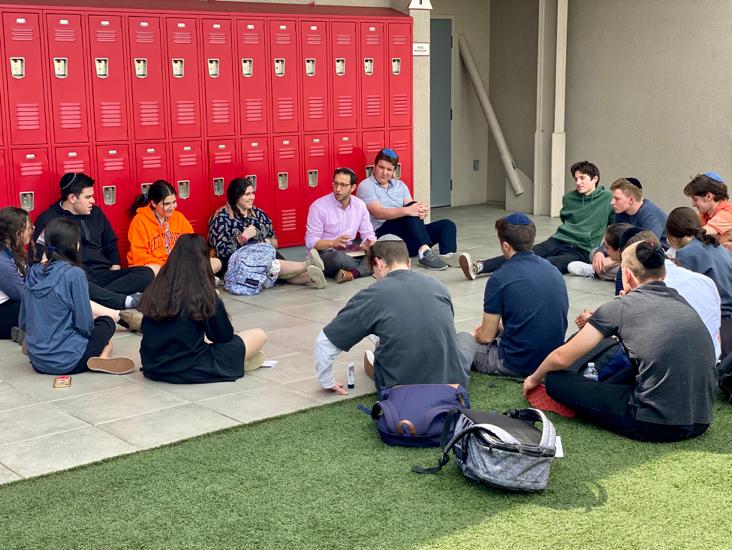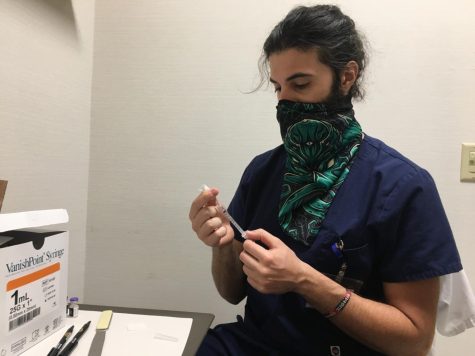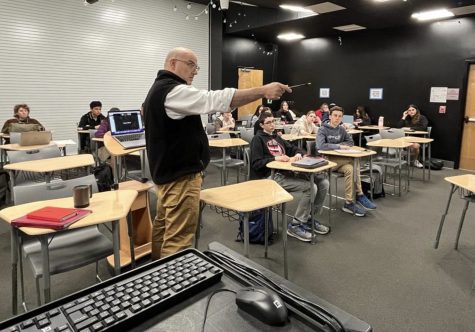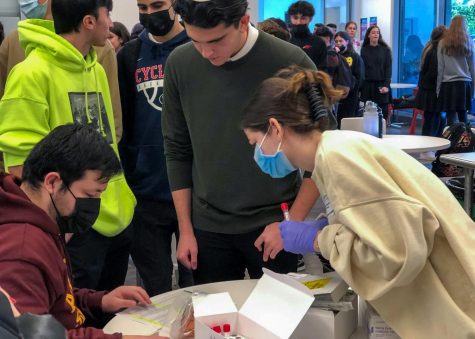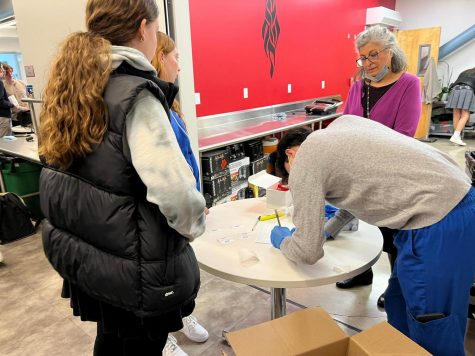God, fragility and coronavirus: senior Tanach class seeks religious meaning of quarantine
INTROSPECTION: On the turf March 6, the class discussed Purim and personal insecurity. A week later, the topic was quarantine.
Rabbi Ari Schwarzberg’s senior Tanach class held a Schoology discussion forum last Thursday on the religious significance of quarantine from the coronavirus.
“Given the craziness and uncertainty of our current reality,” Rabbi Schwarzberg wrote in the discussion description, “I’d like you all to take a few steps back at the beginning of class to think about what’s going on reflectively.”
He then instructed students to respond to this prompt:
“Let’s say someone came to you with an inquiry about the religious, spiritual, or moral significance of Corona and quarantine. They wanted to process their current reality seeking some meaning or symbolism out of it.
“Obviously, you do not and cannot know, but what ‘pastoral’ advice would you give to a person looking for deeper meaning?”
Here are most of the students’ responses, all used with permission and edited only for spelling and minor syntactical errors. Entry headings have been added by the Boiling Point.
[su_spoiler title=”Evan Rubel: We are vulnerable, and quarantine gives us time to consider what this means.
” open=”yes” style=”fancy” icon=”arrow-circle-2″]
Our world is undeniably a different place than it was just several months ago. Chaos and uncertainty plague humanity, which are proving to be, perhaps, even more lethal than the virus itself. In light of the interconnectedness of our society, COVID-19 has demonstrated just how vulnerable we all are – that, at a moment’s notice, our world can be brought to its knees by something infinitesimal and that there are greater, unknown dangers to our existence. Each and every one of us should consider our role within our communities, our countries, and our world; we should consider and think deeply about how we affect others and what affects our actions have. One protective measure – quarantine – actually empowers us to contemplate what is important and how we can contribute to the common good.
[/su_spoiler]
[su_spoiler title=”Jacob Lefkowitz-Brooks: Our world — the good and bad of it — is much more fragile than it seems.
” open=”yes” style=”fancy” icon=”arrow-circle-2″]
I think the most significant philosophical journey one must embark on during this time is that of realizing the arbitrary nature of our existence. We consider things like unsanitized public areas, no sick leave, unreliable and exorbitant health insurance etc as well as fully stocked supermarkets and available hospital beds to be just the way things are. But in times of crisis, these things can fly out the window and we realize how fragile our world is. I think we must appreciate that fragility constantly. It means that we can change things outside of times of crisis.
[/su_spoiler]
[su_spoiler title=”Neima Fax: Quarantine opens us to prayer and to purpose.
” open=”yes” style=”fancy” icon=”arrow-circle-2″]
I had a realization recently because of this virus about why Jewish faith has remained so solid for thousands of years. I was sitting in my bed feeling helpless, worried, stressed, and anxious about all the consequences of Coronavirus and all I felt that all I could do was pray. it was the only power I had. And I realized that the Jewish people have sepnt the majority of their existence feeling helpless, worried, stressed, and anxious about anti-semitism, whatever form it may take. And in those moments of crisis, the only power they had was prayer. And then I started thinking about people who have it way worse than we do. People who are homeless, living paycheck to paycheck, can’t afford healthcare, or don’t have the resources to survive quarantine. Even on a regular basis, these groups of people feel helpless, worried, stressed, and anxious because their future is unsure. If we are stuck in quarantine I would put my time towards coming up with plans to help the underprivileged, because whatever problems we have, they have it way worse, and as Jewish people and just people in general, we have the obligation to help them.
[/su_spoiler]
[su_spoiler title=”Anna Weiss: This crisis is not about religion.
” open=”yes” style=”fancy” icon=”arrow-circle-2″]
I could say something dumb like, “Oh, everything happens for a reason! Hashem has a plan.” Or maybe I would say, “Well, this is Hashem’s way of telling us that we need to be better people and learn to come together as a community to help one another.” Like I said, this is dumb. This does not make me feel better, and I doubt it would make anyone else feel better. The virus seems to continue to penetrate and hurt our community, leaving nothing positive.
I guess one can take this time to do some self-reflecting, learn to live in the moment, and build on their connection with G-d/Judaism, but I think it would be better to focus on the health and needs of your family. I don’t think religion should be anybody’s #1 concern right now. If we focus too much on religion and ignore the reality of the current state of the world, we might not have anyone left to pass on the religion.
I don’t really have any pastoral advice to give. Everything about the Coronavirus is damaging and unfortunate. Our entire world has been put on hold, the economy is plummeting, people are losing their jobs, family members are dying, and the world’s education system has been moved to laptops. I think that right now, it’s difficult to see any good or anything positive coming out of the Coronavirus and the necessary quarantines. Maybe in the future that will change, but for now it just really sucks.
[/su_spoiler]
[su_spoiler title=”Danya Helperin: See quarantine as a spiritual cleansing — as the Torah does — and not a punishment.
” open=”yes” style=”fancy” icon=”arrow-circle-2″]
I would first and foremost say that it is not a punishment. It could be perceived as such because human nature tends to interpret solitude as a negative, but that is more a product of the process than it is the goal of the process. Rather, quarantine could be considered almost a form of cleansing or meditation. To the best of my understanding, in a biblical context, quarantine was usually for cleansing the impure or following a misdeed. In the case of impurity, quarantine served as a separational cleansing, whether physical or spiritual. In the case of a misdeed, it appears consequential on the surface, but I believe it was a time for the person who commited the deed to meditate on their actions and understand their wrongdoings. In the case of both impurity and misdeed, both cleaning and meditation is implied. So, to me, the nature of the situation we’re experiencing seems almost…spiritual? Of course, the coronavirus is a terrible occurence and one should treat it as such, but the method of recovery — quarantine — could be looked at in a more meaningful light.
[/su_spoiler]
[su_spoiler title=”Sheyna Schusterman: A challenge to unity brings a chance for unity, and redemption.
” open=”yes” style=”fancy” icon=”arrow-circle-2″]
If we’re talking about the surface-level meaning of the Coronavirus, I wouldn’t necessarily connect it to religion. However, I do understand that looking at this virus through a lense of religion could be beneficial for many. One trait that I deeply admire about Judaism, which I’m sure is true for many other religions, is the idea of unity. I’m sure all of us can agree that the unity we see in Judaism is truly something special. Although in some situations the virus can limit our exposure to one another, we should attempt to be united. After all, it is in times of need that we depend on each other the most. The virus has also been breaking down the idea of unity because now more than ever, people are separating themselves from one another to remain safe. In our BMT [Beis Medrash Track] mini-mester unit, we began learning a piece on Mashiach. The piece was about redemption, how and why we experience redemption, and what/who causes it. I think this virus might be a sign from God. To truly be redeemed from something, there needs to be some sort of calamity beforehand. In a time like this, where many people are living in fear and there have already been numerous “calamities”, we should become united. This is an important time to engage in Torah learning, mitzvot, and bring more light into the world. If we acknowledge the calamity and why it might be happening to us, we can repent as a response. I see the Coronavirus as a calamity that will result in redemption. Now is the time to turn to people in need and assist others in any way we can. Together, as a Jewish people, and as a community, with our prayers and good deeds, we will reach the light during this difficult time.
[/su_spoiler]
[su_spoiler title=”Sam Rubanowitz: The virus reveals both our insignificance and our significance: everybody matters.
” open=”yes” style=”fancy” icon=”arrow-circle-2″]
The virus teaches us two main ideas:
1. How insignificant we are — our economy is slowing to a halt, cases and deaths are rising to the hundred-thousands, world leaders and the world at large seem to be brought down on their knees — all because of a microscopic virus.
2. More importantly, how SIGNIFICANT we are: The virus “origin story” is a simple one: It is reported to have originated from bats and then to a wet market in Wuhan, and then passed on to humans. One human spread it to others. One human coughed and caused others to get the virus themselves.
In the “age of coronavirus,” each person has such power and significance. Each person is highlighted in the media: “One boy from school X has been contracted with the coronavirus”, “One politician at conference X tests positive for the virus”, and the headlines continue.
Although each person’s power is negative in this case, a positive lesson can be gleaned. Each person has the means to affect large swaths of the population: whether that be through a virus or through their positive attributes, talents, and contributions. As this virus is doing, we must value each person for everything they bring to the table.
[/su_spoiler]
[su_spoiler title=”Rachel Metzger: Quarantine is like a ‘Shabbat’ that lets us rest and think.
” open=”yes” style=”fancy” icon=”arrow-circle-2″]
Last year in class, we discussed the correlation between religiosity and sacrifice/suffering. I think that some of that same logic can be applied to the Corona situation. This virus has revealed downfalls within our society, and forced people to stay at home, with nothing to do except watch TV or read a book or text a friend. With everything being cancelled or postponed, and us essentially having our lives put on hold in many ways, people are being pushed to step back from the world and appreciate how easy life can be. The time we spend in confinement, where we are pushed by the nature of the situation to rest and think, allows us to connect to ourselves and our minds before we step back into the world. Quarantine can be viewed as a “Shabbat” in our lives. It may not be desirable, but it’s here and there is not much to do except allow it to be a time of introspection, and hope that it pushes us to come out of this hard time with a greater drive to rectify the problems in this world. This break from the smooth runnings of society, or the casual way of living to which we are so accustomed, reinforces our humanity by demonstrating our lack of control, which must teach us not only a sense of humility, but a greater motivation to appreciate and work for the world when this pandemic concludes.
[/su_spoiler]
[su_spoiler title=”Alex Rubel: Coronavirus shows us what we can’t control, and what we can.
” open=”yes” style=”fancy” icon=”arrow-circle-2″]
The Coronavirus outbreak is very unfortunate. It is threatening to spread across the globe and infect hundreds of millions of people. However, I believe the “problem” can be split into two components: the biological consequences of the disease, as well as the societal consequences of the disease. The biological consequences of the Coronavirus are unfortunately inevitable. Many people will get sick worldwide. We cannot control that. Yet, on a societal and communal scale, we have full autonomy as to how we react to the pandemic. There are an array of responses to this. Some may panic and horde goods. Others may quarantine themselves, and others will just go on with their daily lives. I believe the Coronavirus will test the strength and grit of our communities. Like many religious occurrences, sometimes the true meaning or significance is unclear – temporarily or existentially. We must come together as people and strengthen our connection with God, striving towards fulfilling our individual purposes as people. This we can control.
[/su_spoiler]
[su_spoiler title=”Maital Hiller: Struggling to find meaning in this, but still trying.
” open=”yes” style=”fancy” icon=”arrow-circle-2″]
It is hard for me to find true meaning with everything happening in the world right now. I am trying to seek the religious significance of the spread of Corona and everyone being quarantined, but it is very hard for me to see the positivity through it all. Usually every bump in the road and obstacle I encounter, throughout my life, I am able to see the light at the end of the tunnel, but I am struggling in this situation. Religiously speaking, on a smaller level and relating to us, I feel like God would want us to attend a trip like Poland-Israel and unite as Jews to learn the history of our people. I know that may sound negative, and I also don’t know what is going to happen in 2 months from now, but that is my take on it. So then I ask myself the question of why and is there a reason why this epidemic is spreading now? What is God’s true intention? I also believe everything happens for a reason, so my goal is to find a purpose of what is occurring in the world, and really try and see the positivity through it all even though it is difficult.
[/su_spoiler]
[su_spoiler title=”Maya Tochner: Like Judaism, this reminds us that we’re smaller pieces of a much larger system that is out of our control.
” open=”yes” style=”fancy” icon=”arrow-circle-2″]
One of my favorite parts about being a Jew — or a part of a religion in general — is that I am constantly reminded of the workings of the world that are larger than me. Whether that be God, nature, or just the greater community, I am just a small piece of a much larger system. I’m reminded of this by keeping kosher, davening, and other similar things that turn mundane parts of my life into things that are meaningful, or at the very least, make me think twice about what I’m doing. It’s humbling, and kind of cool to think about. With the coronavirus, I am reminded again about how nature exists outside of our own lives, plans, and goings on. Even though the virus is scary and dangerous, it’s also important to realize that things happen outside of our control and for reasons we can’t understand. This too can be humbling, and kind of cool to think about.
[/su_spoiler]
[su_spoiler title=”Tobias Lee: Life is sometimes not how we planned it.
” open=”yes” style=”fancy” icon=”arrow-circle-2″]
A “pshat” [the simplest or literal] answer to this that I think would be helpful is saying that corona helps us realize that we are flawed and imperfect. Corona is an unfortunate illness, but if it falls upon you, it can help you realize that you are work in progress and have a long way to go. I think being in quarantine can also help a person stop and think about what’s truly important in life. Everything is so fast paced in society and we often forget about what’s truly important in life. Having Corona and being in quarantine can help someone reflect about what they truly value in life. Another lesson I could teach about this is the randomness and craziness of life. I’m not sure if everything happens for a reason or not, but I think that Corona can teach us that life is sometimes not how we planned it.
[/su_spoiler]
[su_spoiler title=”Jacqueline Englanoff: What counts is how we react.
” open=”yes” style=”fancy” icon=”arrow-circle-2″]
Obviously it is always hard to justify or come to terms with God’s role in all aspects of the world, taking the good with the bad. Like when we pray for the sick, but under the same idea that God is the one putting the sickness on them? With all of these situations, I look more to how we react to the situations, and what that says about our religious commitment/purpose. We cannot think about how or why this is happening unless we think about how/why we react. In times like these, it is important that we look out for the wellbeings of ourselves and others. We try to ensure that we are making the right decisions and doing our part to come together in spirit and support each other. We react by uniting rather than dividing, and when so many things seem to be “canceled” we make sure that what really matters to us does prevail. Being cautious, looking out for our neighbors, and keeping in mind what we really care about is how we can best act in this time, and this is the real test we have. This will be how we can find meaning in all of this craziness.
[/su_spoiler]
[su_spoiler title=”Kelly Ciment: Didn’t God bring this? But I still pray.
” open=”yes” style=”fancy” icon=”arrow-circle-2″]
I’ve had many conversations about what can happen to the world from the outbreak. Is everyone going to have to be on lockdown? Family and personal friends of mine have been affected by COVID-19 and it’s scary. Thank God they didn’t catch it but they were under quarantine. I was nervous to look at my phone and see the updates of who and where the virus hit. It’s frightening to even think about being a carrier and that I can pass it on to my grandparents, or even to my great-grandma. From a religious standpoint, it’s tough to pray to God, because isn’t He the one who brought the sickness? Yet, I still pray to God hoping the outbreak calms down. I pray that everyone is safe and that less people start dying. I pray that Israel comes up with a cure quickly. Everyone has their perspective on whether or not we should be canceling events, for example, our Poland-Israel trip. It’s important that we don’t lose faith, but is it worth it to get the virus?
[/su_spoiler]
[su_spoiler title=”David Edwards: Nature controls us, yet we persevere
” open=”yes” style=”fancy” icon=”arrow-circle-2″]
It is said that Marcus Aurelius, the Roman Emperor at one of Rome’s highest peaks, the most powerful and influential person in the world, would, every so often, sleep on the floor and wear sack cloth. He would eat simple food, bread and water, straying away from the luxuries to which he was accustomed. This was meant to show that what many of us fear, losing all one’s money and sufficing to poverty, was in the end—survivable. In fact, not merely survivable, thrivable. This practice was on one hand meant to greaten the appreciation one has for the simple things in life, but primarily to push Marcus to the point of uncomfortability that most would fear even approaching.
Coronavirus is our floor and sackcloth. If we were told one year ago today, that we would be facing a pandemic, many would be frightened and terrified, not even being able to imagine living through this sort of apocalyptic scenario. However, now that we are settling into our new lives under a state of pandemic, we are beginning to see the capacity of the human spirit—the capacity we have to survive through all circumstances which are thrown our way by the universe. In the end, we see that we have no full control over anything besides our thoughts and our actions, Marcus knew this. All we can do is show that we have mastered ourselves, and that humanity can persevere through all conditions—even our greatest fears.
The most powerful governments and people in the world are showing that they too have no mastery over nature, and that nature masters us. Artifice is nothing when matched with the true brunt of its maker: nature. Therefore, in this time of peril, surely we should look to further appreciate and exemplify our gratitude for the simple act of being in school or of seeing friends, because in the end, it can all be taken away from us in a second by the forces of nature which will always rule over us: no matter our scientific discovery or study of engineering and the elements. Yet, most importantly, we should know that no matter what, we can adapt and survive through anything, and this time of tragedy shall serve as a testament to our human will for the rest of our lives, and hopefully history.
[/su_spoiler]
Staff writer Benjamin Gamson contributed to this story.

Sam Rubanowitz currently serves as Executive Producer of the Talking Point podcast, as well as Outside News Editor and Chief Video Editor of the Boiling Point. Sam joined as a staff writer at the start of 11th grade, contributing artwork also and winning awards for both writing and illustration. Last year he became BP’s first traveling correspondent, flying to Arizona to follow a Los Angeles synagogue group volunteering to help migrants arriving in the U.S. from Central America. He has written extensively on immigration and other political and governmental topics.
After taking the Computer Science course offered at Shalhevet in his junior year, Sam fell in love with programming and took his passion further by interning as a programmer at California Association of Realtors® last summer.
He is a member of three committees on the Del Rey Neighborhood Council and enjoys problem-solving and thought-provoking discussions.

